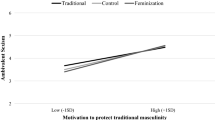Abstract
The mythopoetic men’s movement has been criticized for its self-absorption and uninvolvement in social action. This article argues that social change begins with the kind of individual quest that allows one to operate from a place of peace and justice within oneself, and that the mythopoetic men’s movement offers some the encouragement to do this. The purpose of the mythopoetic movement is not to strengthen men’s identification with traditional masculinities but rather to encourage them to descend beneath the trappings of cultural engendering to find, as women are also committed to finding, their own voices.
Similar content being viewed by others
Works Cited
Bly, Robert.Iron John: A Book About Men. Reading, MA: Addison-Wesley, 1990.
_____.Sleepers Joining Hands. NY: Harper, 1973.
Chodorow, Nancy.The Reproduction of Mothering: Psychoanalysis and the Sociology of Gender. Berkeley: U of California P, 1978.
Hagan, Kay Leigh, ed.Women Respond to the Men’s Movement: A Feminist Collection. San Francisco: Harper, 1992.
Heller, Scott. “Scholars Debunk the Marlboro Man; Examining Sterotypes of Masculinity.”The Chronicle of Higher Education 3 Feb. 1993: A6–A8.
Author information
Authors and Affiliations
Rights and permissions
About this article
Cite this article
Richard-Allerdyce, D. Hearing the other: Social change and individual growth in the women’s, men’s, and eco-spirituality movements. Feminist Issues 14, 57–66 (1994). https://doi.org/10.1007/BF02685652
Issue Date:
DOI: https://doi.org/10.1007/BF02685652




